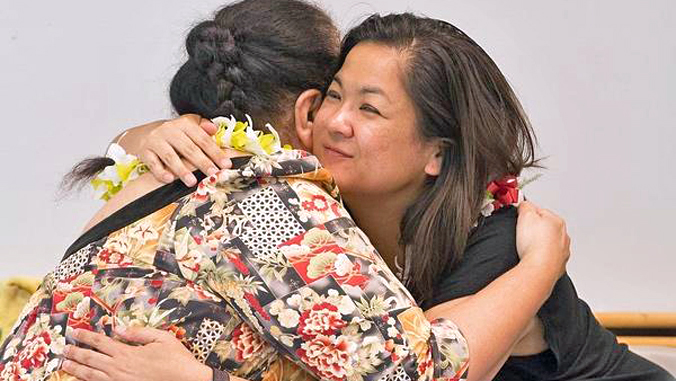
The U.S. Senate hearing on Brett Kavanaugh, Supreme Court justice nominee, dominated the 4th Annual Women In Medicine “talk story” session at the University of Hawaiʻi at Mānoa John A. Burns School of Medicine (JABSOM).
Speakers included Reni Soon, JABSOM associate professor of obstetrics, gynecology and women’s health; and Naleen Andrade, the first Native Hawaiian woman to become a psychiatrist and lead a department of psychiatry within a U.S. medical school. Andrade is also past president of the American College of Psychiatrists and former board chair of the Queen’s Health Systems.
Soon said watching the hearings about Judge Kavanaugh, who has been accused of sexual aggression and assault, left her incredibly exhausted. Soon said her fatigue was caused by absorbing the pain recalled by one of Kavanaugh’s alleged victims and observing the way U.S. senators questioned her.
“His testimony was bile-inducing,” said Soon, speaking at the Women in Medicine event. She noted that, while he denied the allegations of Christine Blasey Ford, Kavanaugh’s behavior before the Senate committee was disturbing. “He embodies this rich, white, male privilege,” she said. “Complete entitlement.”
Soon said the field of medicine is not immune to the culture of sexual harassment, noting that she has seen sexual harassment and is ashamed that she did not always call it out. “We need to be leaders,” Soon said. “We need to take those jobs (leadership positions). We deserve those jobs. We have to get those positions of power.”
Added Andrade, “We saw a stark and some would say horrifying example (of the wrong type of leadership) as we watched our U.S. Senate over the past 48 hours. I pray that they can find the path to redemption and restore our hope in its republic and institutions.”
Although Andrade led the JABSOM department of psychiatry (1995–2012), presided over JABSOM graduate medical education (2012–2016) and chaired the Queen’s Health Systems board, she said assuming and wielding power was not something that she was always comfortable doing.
She quoted a national leader, one of her mentors, from whom she learned an indelible concept. “An effective leader must learn to build and use power to achieve his or her organization’s purpose and aims,” said Andrade. “It would take me two decades to fully comprehend and effectively apply this leadership principle. I think the reason it took me so long to fully grasp it was an underlying assumption that women should not and cannot wield power.”
For the full story, go to the JABSOM website.
—By Tina Shelton

